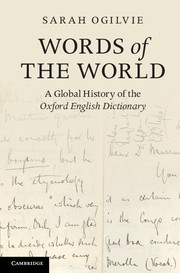Book contents
- Frontmatter
- Contents
- List of illustrations
- List of appendix figures
- Miscellaneous Frontmatter
- Preface
- Acknowledgements
- 1 Entering the OED
- 2 A global dictionary from the beginning
- 3 James Murray and Words of the World
- 4 James Murray and the Stanford Dictionary controversy
- 5 William Craigie, Charles Onions, and the mysterious case of the vanishing tramlines
- 6 Robert Burchfield and words of the world in the OED Supplements
- 7 Conclusion
- Bibliography
- Index
- Plate Section
3 - James Murray and Words of the World
Published online by Cambridge University Press: 05 November 2012
- Frontmatter
- Contents
- List of illustrations
- List of appendix figures
- Miscellaneous Frontmatter
- Preface
- Acknowledgements
- 1 Entering the OED
- 2 A global dictionary from the beginning
- 3 James Murray and Words of the World
- 4 James Murray and the Stanford Dictionary controversy
- 5 William Craigie, Charles Onions, and the mysterious case of the vanishing tramlines
- 6 Robert Burchfield and words of the world in the OED Supplements
- 7 Conclusion
- Bibliography
- Index
- Plate Section
Summary
It is man by man that Englishmen get the idea of a boomerang, a reredos, a caucus, or a tomato, and find a use for the name of it. Thus the English language is surrounded by a penumbra of French, Italian, Spanish, Turkish, Arabic, Hindustani, Malay, Zulu, words, some of which are “English” to some Englishmen, and undreamt of to others. At which Englishman’s speech does English terminate?
James Murray, Presidential Address to the Philological Society, 1880James Murray frequently emphasized the rightful place that words of the world had in the English language, and he was committed to including them in his dictionary. ‘Hardly any word from a foreign language looks odd or out of place among our home words,’ he told students at Oxford University late in his career:
We can adopt a foreign noun . . . without raising awkward questions of what gender is the noun to be in English. . . . We say potatoes, and teas, and tamarinds, and tattoos, and wigwams, and kangaroos, and Rajahs, and quidnuncs, without the slightest thought or doubt. So with our verbs: if we salaam an oriental magnate, we talk of salaaming him, or say we have salaam’d him without the slightest compunction.
Murray admired the ability of English to adopt ‘alien elements’ and to give them English inflections and grammar. He used dictionary statistics to demonstrate the ease with which English admits foreign words:
Some notion of the extent to which this is done is afforded by the fact that in the latest double section of the Oxford English Dictionary, which contains the words beginning with Ta-, and a few of those in Te-, it is stated that among the 1717 simple words treated, the words taken bodily from Foreign languages number 150, and that these are taken from no fewer than 55 languages, 11 European, 16 Asiatic, more than 10 Polynesian and Australian, more than 10 American North and South, and about 5 African languages.
- Type
- Chapter
- Information
- Words of the WorldA Global History of the Oxford English Dictionary, pp. 53 - 103Publisher: Cambridge University PressPrint publication year: 2012



